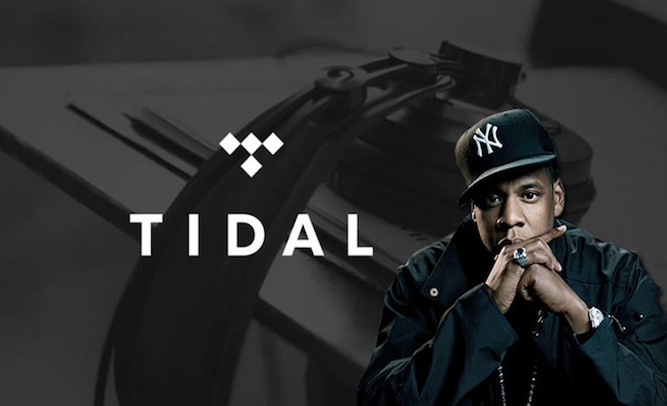Jay-Z’s Streaming Service
In late January this year, Jay-Z acquired a majority stake in Scandinavian music streaming company, Aspiro, known as Tidal in the UK and US. Tidal is a two-tier service offering a basic service at the same price as Spotify’s premium and a premium service which offers CD music quality for double the price. Shawn Carter, aka Jay-Z, reached out to fellow superstar artists including Beyoncé, Rihanna, Kanye West, Madonna, Deadmau5 and Jack White among others to endorse his new brand and speak of something they called a musical revolution at a celebrity press conference. Tidal (540k subscribers) competes with industry leader, Spotify (60m active users, 15m paying) and Apple’s newly-acquired Beats Music streaming service (300k subscribers). The question is how does Jay-Z plan to compete?
According to Jay-Z, there are 3 main reasons customers will pay for Tidal:
1) A sense of ethics in offering artists “respectable royalties”
2) Exclusive content from artists endorsing Tidal
3) Higher sound quality (in Premium only, $20/month)
I’m not a businessman, I’m a business, man!
The Tidal Business Model
Jay-Z isn’t a businessman. He’s a business, man! What I mean is, though one of the world’s richest musicians, he clearly never studied marketing. Most of his ‘business experience’ is just celebrity endorsement. Jay-Z positions his newly-acquired streaming service, Tidal, as a streaming service with focus on the artist rather than the customer. Everything I learned at university taught me that approach is outdated. Now that customers have more purchasing power than ever, they must be the focus. Charging a premium for an already-existing service in a well-established industry is business suicide.
Ethical Treatment of Artists
Shawn Carter expects customers to pay a premium for ‘ethical’ treatment of artists, bonus tracks and improved music quality. With regard to the first of these benefits, Jay-Z and every other superstar endorsing the brand are the definition of the music industry’s 1%. Preoccupation for ethics almost seems funny when you realize their underlying motive is simple: more money for themselves, the corporate superstars. How beneficial will their service be for the majority of musicians? The Indie-pop artist known as Marina and the Diamonds recently spoke out on Twitter against Tidal as the venture seems to only make the rich richer.

Exclusive Content
The second point, exclusive content, might be its most attractive selling point. The celebrities endorsing Tidal are the biggest in the world for a reason; they have millions of fans who love them and are willing to pay anything for exclusive content that might not exist in other services. Jay-Z pulled his 1996 album, Reasonable doubt, from Spotify in an attempt to convince some Spotify users to migrate to Tidal. Though this is a compelling argument for many die-hard fans, I already have a counterargument; once something is online, it can be shared instantly for free, especially when it involves such high profile names. Kanye West’s Yeezus leaked days before its official release in 2013, similar to Jack White in June last year and Madonna in December. My point: high profile content gets leaked and always will. Using Spotify’s ‘Local files’ function, which allows you to store any mp3 you have in the Spotify application (whether legal or illegal), this particular selling point becomes moot.
Sound Quality
The third reason, music quality, may be the most deceptive on the list; it is the only benefit of Tidal Premium over its basic service. The quality is set at “CD quality” with a bitrate of 1411 kbps compared to Spotify’s maximum 320kbps. Though Dr. Dre started a revolution in upper-range headphones with Beats by Dre years ago, most music listeners still use cheaper variant, in-ear earphones with low thresholds for music quality. Even most Beats by Dre owners would not realize the difference. In fact, since Spotify launched in 2008, it has steadily increased the quality of music in correlation with rising internet speeds to reach an equilibrium between sound quality and buffer times. It is expected to continue on the same trajectory in the near future. I personally set my Spotify quality to 96kbps because I don’t notice a difference other than diminishing buffer times. Jay-Z’s Tidal on the other hand is already being criticized for its long loading times.
In conclusion, Jay-Z’s Tidal is not a “Spotify Killer” as many still seem to think, the main reason of which is the price. Tidal’s basic service costs the same as Spotify’s Premium, only adding “ethics and premium content”. In my opinion, a minuscule market share is ever likely to pay for such a high sound quality, but is that so shocking? After all, the largest music streaming service in the world, YouTube, is free and has the worst quality. The sad and obvious truth is that Jay-Z’s $56 Million acquisition of Aspiro and Tidal was not for the music; it was for the money. And clearly it’s going to work, I mean it’s Jay-Z after all. How many fans do he and his ragtag crew of superstars have? Bloody millions! A billion even? And every Superfan will want any exclusive content they get their hands on. Now it’s not just big business that wants all people’s money, all my favorite artists do as well. #TidalforAll The American music industry is so mainstream, Tidal will work just because it’s endorsed by the biggest names in music. Jay-Z, Beyonce and Madonna’s combined net worth totals more than $2 Billion alone.
However, though Tidal may cause some ripples in the tide, it will never be the Spotify Killer some people expect. It’ll always just be a Spotify knock-off with Celebrity Faces.






